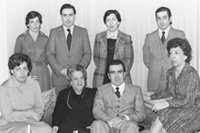Casa Museo Eduardo Frei Montalva has a collection of more than 370 heritage and historic objects, such as the ex-President’s private library, clothes from the 60’s, the original furniture and some testimonies through which the public and private life of a protagonist of the Chilean history may be known.

This month, we emphasize the intimate and daily family life and historic heritage of Eduardo Frei Montalva.
During the last decades, historians have expanded their field of study, incorporating not only the political and economic history, but also peoples’ private and daily life. Thus, family, as a social and dynamic institution, has become an important field of investigation.
Family is defined in two different aspects, according to economic and politic variables, and also based on ways of thinking and sensitivity. From the sixteenth century and especially in the nineteenth century, in the Western world some changes in everyday life occurred, they gave shape to the nuclear family, typical of urban area in the twenty century. A kind of sensitivity that divided in two clear dimensions, the public and private life settled. So family, as we understanding it today, is inseparable from the privacy of one’s home. In Chile, political implementations by the state promoted this kind of organization, specifically the integration of rural people that migrated to the cities.
The Frei Ruiz-Tagle family can be seen as a model of this kind of bond. An important father, a breadwinner, who worked for the public service, who along with his wife, a protective mother, cared of their children and home, shared an intimate space at home. According to testimonies provided by the Frei family, the ex-president didn’t allow discussions about politics in his house; his political activity was made outside his home. In fact, Mrs. María Ruiz-Tagle never enrolled with Christian Democratic Party and, except during her period as First Lady, she got slightly involved in the political life of her husband. He provided for his family and Mrs. María raised their children.
Home was the place for expressing affections. Eduardo Frei’s oldest daughter, Irene Frei Ruiz-Tagle, remember her father as a man that loved to have fun with his children. He liked to play pillow fights and the trickling game with them. As a father, they remembered him loving but demanding. He didn’t like his children got failing grades at school and gave importance to foreign language study. But they also admitted that he was more agreeable than Mrs. María was. She used to say “I am the witch” because she worried about the discipline at home.
Eduardo Frei was calm and funny in the privacy of his house. There is a story that his children remember. One Christmas eve, Eduardo Frei dresses up as Santa Claus trying to surprise them. That night the kids came out of the house and someone turned the lights off. Eduardo Frei was wearing a Santa Claus mask and a white sheet and he shouted “Come with me, kids, I’m Santa Claus”. The children cried and run out screaming and after that happened, they didn’t want to get inside the house again. “It’s a mask”, Eduardo Frei said to the children but when they saw the mask, they cried more and more. He took the sheet off but it was no use.
The family used to go to the church and enjoy walks in the nature. Eduardo Frei and María Ruiz-Tagle taught their children their faith and principles that are present in the entire family.
Comentarios cerrados.